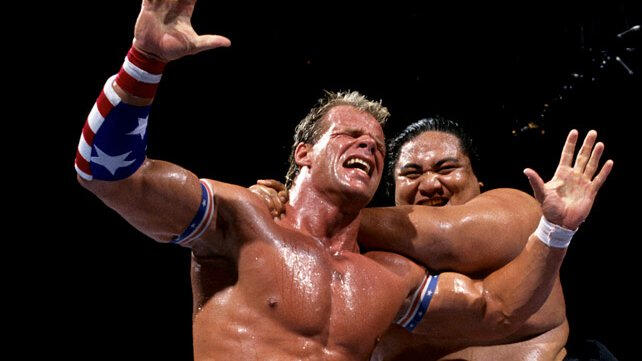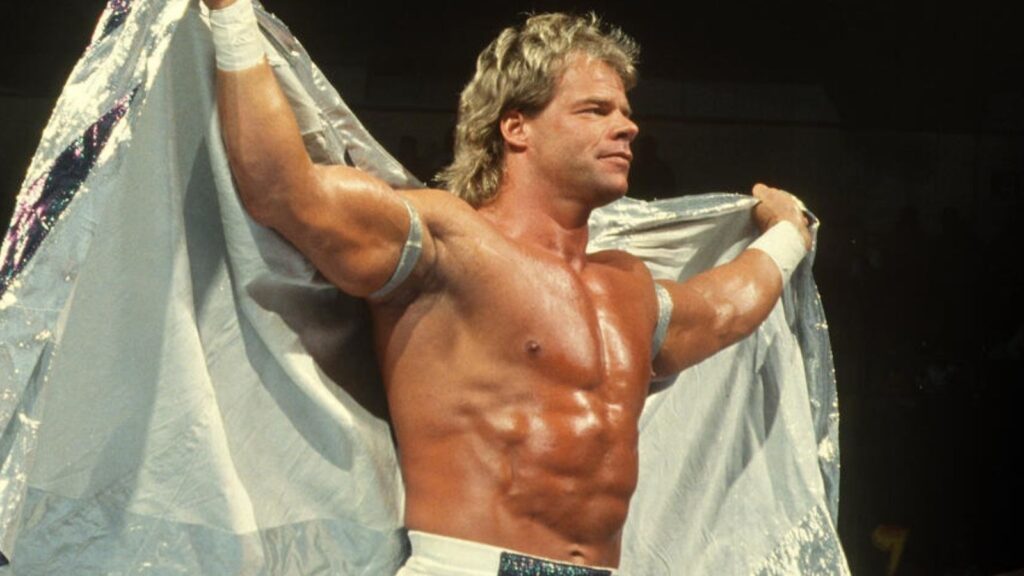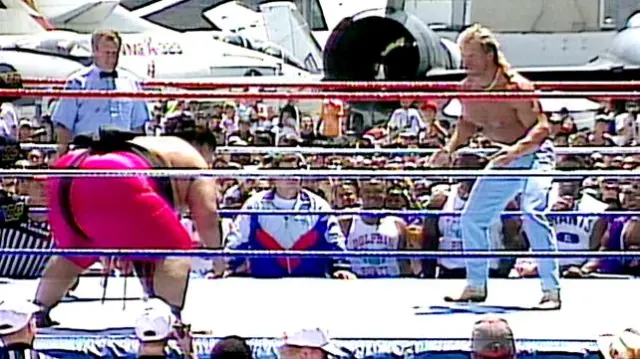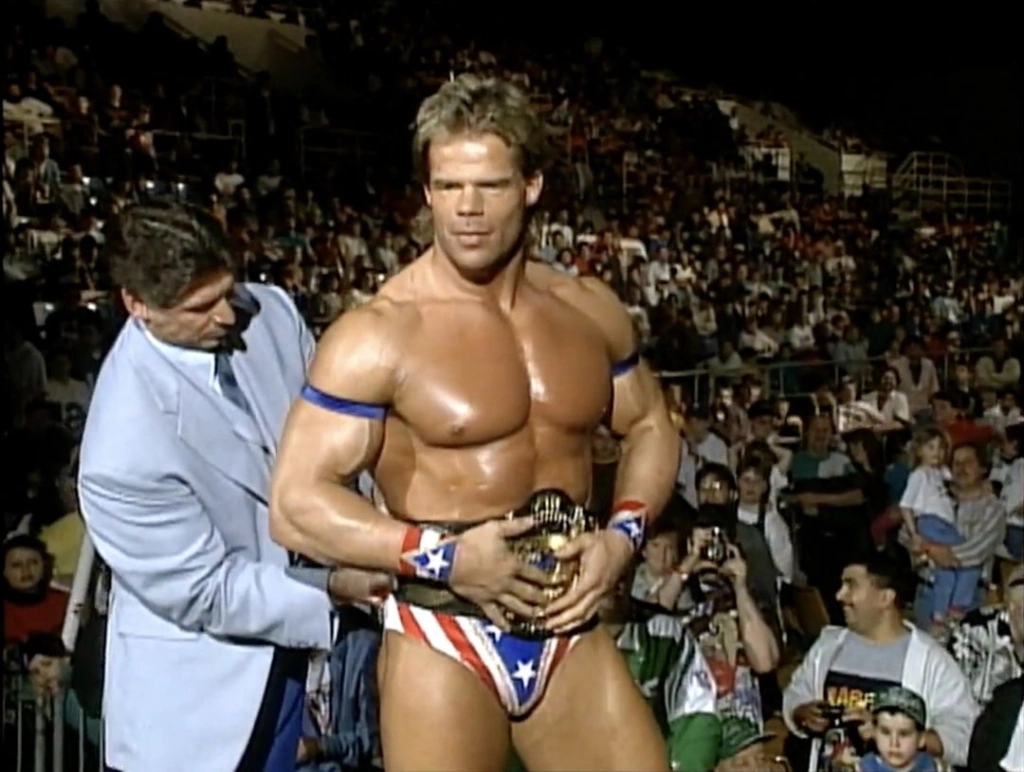
Narcissist to American Hero – The Ups and Downs of Lex Luger in the WWF
The fans cheered in unison in the Palace, as red white and blue balloons cascaded from the sky like a summer rain. The American hero Lex Luger smiled triumphantly atop the burly shoulders of Rick and Scott Steiner, as his opponent, the WWF champion Yokozuna, lay flat on his back on the outside of the ring. It was indeed a joyous occasion, when the Japanese foreign menace had been put down by the might of the United States. Except, it was very much a phallic victory, for despite getting his arms raised, Lex was not going home with the WWF Title. He had not pinned Yokozuna square in the center of the ring with his patented running forearm, reinforced by steel, but simply got a disappointing count-out win. This was already the beginning of the end of Lex Luger as a main event force after such an expensive and hyped build.
So, what happened? Why was so much and time and money poured into making Lex Luger not just a main event contender, but a guaranteed champion and babyface hero, only to change course right before arriving at the destination?

Lex Luger signed with Titan Sports in 1992, but not as a wrestler. It was for Vince McMahon’s other project, the World Bodybuilding Federation. Previously, Luger worked for WCW, and negotiated a way out of his contract. No doubt Lex working as an announcer for the WBF was a temporary position until he was legally cleared to wrestle in the WWF, a position that became very temporary when Vince shut down the WBF shortly after the second WBF championship. That event drew a paltry number on pay-per-view; Luger was set to compete but dropped out after a motorcycle accident. By the time he as fit for action, Vince had shut down operations.
So at the 1993 Royal Rumble, Bobby Heenan spoke with Luger via satellite. Heenan’s introducing of Luger was over the top, as he verbally fellated Luger in his describing of not a mere man, but a virtual God of a wrestler, who was even more perfect than Mr. Perfect, whom “The Brain” was feuding with at the time. Originally called Narcissus – a character from Greek mythology – it became “The Narcissist” when it was time for Luger to show his complete package in the squared circle.
Befitting this Godly presentation was his ring attire, a whitish gray ensemble, with a shiny cape that was removed before matches. His entrance music was a tune that may be heard in the heavens, and his promo style was that of a man who’s head was firmly in the clouds, looking down at all the wretched people beneath him, and certainly with not a care in the world. By virtue of his impressive physique, which appeared to be carved from a block of granite, this alone would be enough to overwhelm any hapless opponent. And if all that was not enough, matches often took a bit of time to start, as Flexy Lexy found himself irresistible, unable to avert his eyes from his own reflection, provided by a full-length mirror set up in the ring.
Luger defeated Mr. Perfect at Wrestlemania IX, but a backstage altercation between Perfect and Shawn Michaels seemed to suggest that a long-term feud was now off the table. Perfect and Michaels would have an ECW-like brawl outside the arena on Monday Night RAW, and so Luger went on dispatching ham ‘n’ eggers.
Also on the card at Wrestlemania was Hulk Hogan. In January, a few months before the big show in Las Vegas, ‘The Hulkster’ had returned to the Federation on Monday Night RAW to speak about a horrible attack on his friend Brutus Beefcake by the Tag Team champions, Money Inc. So brutal had been the assault on Brutus’ fragile face – it had been Beefcake’s first match since a serious parasailing accident in 1991 – that Money Inc’s manager Jimmy Hart left them and became a Hulkamaniac. After losing to Money Inc by disqualification, Hulk then came to the ‘aid’ of Bret Hart, who had just lost the WWF Title to Yokozuna. Yoko’s manager Mr. Fuji foolishly challenged Hogan to step in the ring with the new champion, and about two minutes later, Hogan defeated Yokozuna for a then-record fifth WWF championship.
It’s important to mention this when talking about the path of Lex Luger going forward. Hogan had ‘retired’ from wrestling at the previous Wrestlemania to pursue acting roles in movies and television. But then a deal was struck for Hogan to return, and somewhere along the way, Vince thought it a good idea to make him champion.
The reason this applies to Luger is that by the time the next pay-per-view (King of the Ring) rolled around, things had soured with Hulk Hogan. Unlike Bret Hart, who was cast as a ‘fighting champion’ taking on all-comers week in week out, Hogan never made one appearance to defend the title up until the June 13 King of the Ring event, where he dropped it back to Yokozuna. Before KOTR, Hogan had made an appearance in Japan, and at a press conference, denounced the WWF title as a “trinket” and “a toy.” On the same card, ‘The Hitman’ worked three good to great matches – with the semifinal over Mr. Perfect being a particular standout – in an attempt to prove a major point to McMahon. Meanwhile, Luger was bundled out of the opening round when he went to a fifteen minute time-limit draw with Tatanka and both were eliminated.
After losing the belt, Hogan embarked on a tour of Europe for the WWF and left again, seemingly for good this time.
Perhaps the natural process would have been to have Bret Hart feud with Yokozuna to get back the WWF title. Instead, during the KOTR coronation, Bret was blindsided by Jerry ‘The King’ Lawler, sparking a long-running feud. Now, Vince needed someone to step into Hulk’s lofty boots, but instead of yellow, they were bedecked in the red, white and blue.

In the blink of an eye, Luger went from being a self-serving, well, narcissist, to a humble hero when he arrived on board the USS Intrepid on Independence Day to confront Yokozuna. In our article on all things WWF in the year 1993, we go through all of this, but the gist was that Fuji wanted to rub America’s face into his man Yokozuna crushing America and Hulkamania in one sitting (the KOTR victory), and so set up a ‘bodyslam challenge.’ All looked lost until Luger managed the feat, and thus the beginning of Vince’s plan to move on from Hulk Hogan kicked off.
A contract signing for Summerslam took place on RAW, as Lex embarked on an expensive Call to Action campaign to whip up support across the country. Called the Lex Express, the lavishly bedecked bus took Lex to meet and greets and autograph signings to make everyone forget what an egotistical you know what he had been. It had to be a whiplash like effect to the fans, which was apparently why such a big build to Summerslam was necessary to sell Luger as the new and improved Hulk Hogan, who would succeed where the aging Hulkster had failed. To further push the need for fans to get behind the new American hero, some other ‘foreign menaces’ arrived in the WWF, including Ludvig Borga and The Quebecers.
But then, Summerslam arrived. As alluded to at the start of the article, Lex failed to become the WWF champion. It was a count-out and as long-time wrestling fans all know, a championship cannot change hands on a count-out. Somewhere along the way, Vince changed his mind. Yokozuna would live to fight another day. Meanwhile, as Luger continued to grit his teeth through more celebrating backstage, he was challenged by the newcomer Borga, a Finnish bodybuilder, boxer and wrestler who was portrayed as possibly the first true environmental warrior, as he turned his nose up at the pollution and decadence of the United States.
Much like what seems to be happening in today’s political climate, it appeared that nations everywhere were coming after the good old US of A going into Survivor Series. Here, Lex captained a team of All Americans against Yokozuna’s so-called Foreign Fanatics. Luger got a good pop and sent the fans home happy after pinning the hated Borga and being the sole survivor, but the match that garnered the most attention was the development between Bret Hart and his younger brother Owen at the end of their match. Owen was frustrated having been the only one eliminated on his team of Hart brothers against Shawn Michaels and three masked men, and took it out on Bret. This situation was cooled over the Christmas holidays, but would quickly reignite into the feud of 1994.
The loss to Yokozuna at Summerslam would prove costly for Lex’s career, but also in storyline terms. When Luger signed the contract for Summerslam, he was informed by Yoko’s new loudmouth American spokesperson Jim Cornette, that he had one and only one shot at the title. Lex had fallen short, but as was tradition, he could get another chance if he won the Royal Rumble in the new year. Fuji connived to prevent Luger from getting a second match with Yokozuna by drafting in ‘assassins’ Tenryu and The Great Kabuki to appear in the Rumble. They were not a factor, but, for the second time, Lex stumbled to a degree, when both he and Bret went over the top rope together to end the Rumble. The referees couldn’t come to a clear and concise decision, so WWF President Jack Tunney stepped in and made Lex and Bret co-winners.
Wrestlemania X had to be where Lex made his stand. He had faltered at Summerslam ’93 despite a huge build up, but had regathered to at least co-win the Rumble to earn another title shot. Yokozuna had managed to get past The Undertaker in a casket match at the Rumble (albeit with the help of the entire heel locker room). Still, Yokozuna was the champion, and Lex could put the Summerslam count-out behind him by definitively beating him on at the ‘grandest stage of them all.’ But February 22, 1994 may have sealed Lex’s fate.
It was at the February 22 Superstars taping that Vince tried a little experiment. This is also detailed in our WWF in review for 1994 article, where in an unaired segment, Vince had Lex announced as the new WWF champion to gauge the fan reaction. Apparently, it was not to McMahon’s liking, and perhaps he also finally started to believe that Bret Hart was the man he really needed all along. Because at Wrestlemania X at Madison Square Garden on March 10, it was a Canadian hero – Bret Hart – and not the ‘American Original’ Lex Luger who left as the WWF champion.
Lex’s match with Yokozuna featured an old foe – Mr Perfect – as special referee, and perhaps due to past grievances, Perfect officiated poorly and ended up disqualifying a frustrated Luger after being shoved for not counting a pinfall. On the other hand, Bret shook off being upset in the opening match by Owen to go on and beat Yokozuna. Simply put, McMahon recognised – and was correct – that the fans liked Bret more, and very much respected him in a way they didn’t with Lex.

After the second attempt at becoming WWF champion failed, Lex was put in a middle-of-the-road feud with former friend, Tatanka. It was the Native American who first accused Lex of selling out to Ted Dibiase, who was quickly assembling a Million Dollar Corporation. At Summerslam, where the two met, it turned out to be Tatanka who had taken Dibiase’s money. At the Survivor Series, Luger was unable to repeat his success of the previous year, as he was pinned by blast-from-the-past King Kong Bundy. Less than twenty four hours after Survivor Series, where Bret lost the WWF title to Bob Backlund, Diesel Jacknifed and pinned Backlund in under ten seconds at Madison Square Garden, and became the face of the so-called New Generation, further pushing Lex down in the rankings.
Lex did make a strong showing at the Royal Rumble in 1995, and was part of the final four before being eliminated by eventual winner, Shawn Michaels. He was put into a team with The British Bulldog (The Allied Powers), until Bulldog turned on Luger. But was Lex wasn’t sticking around to see through the new rivalry. His contract was up for renewal, and McMahon attempted to get a deal done. Luger had other plans, however, and sent feelers to his old buddy Sting at WCW, who bugged Eric Bischoff enough to offer him a contract.
There are a combination of factors that contributed to the quick rise and fall of Lex Luger in the WWF. It is not to say that Lex slid down the card after Wrestlemania X, and his contract allowed to expire. Luger was still in the frame and had his supporters. But after the paltry count-out at Summerslam, and falling short again at Wrestlemania, Lex struggled to regain the faith Vince McMahon previously had in him. He also didn’t connect with the fans the way McMahon had hoped, for which this is not entirely Luger’s fault. In manufacturing another Hulk Hogan, Lex was not allowed to be himself, and get over on his own. He was filling the shoes of a beloved figure who had done so much to build the WWF in the past, and Luger was meant to emulate his feats in a short period of time.
Luger was also up against Bret Hart as the top babyface hero, which was a natural fit for ‘The Hitman,’ and not so much for Lex. Bret seemed much more comfortable with the fans and garnering respect from them. Bret’s journey had been a tough one, going back to when he first entered the Federation in 1984. For years, Bret flew under McMahon’s radar, and only gathered momentum when he and brother-in-law Jim Neidhart made their mark as a tag team, one that would be deemed as one of the greatest of all time. Then, he was allowed to spread his wings as a single and become a fine Intercontinental champion, but there were other bigger obstacles in Bret’s path. But with the steroid scandal rocking the WWF to their very core, suddenly there was a need for more men like Bret Hart, who presented a much better image for the company, even if it did go against Vince’s usual pattern of pushing muscle-bound freaks to the main events. Simply put, Bret was much more relatable. Then, the big seven footer Diesel made his way into the main event picture as a babyface, providing more stiff competition for Lex to overcome.
In the end though, Luger made a solid business decision. He took the gamble, knowing that his stock had fallen badly in the WWF, and jumped to the competition. This proved to be a wise move, as he became a key weapon in the Monday Night War by his audacious showing on the debut Monday Nitro up until 1998. But that’s a story for another time…
